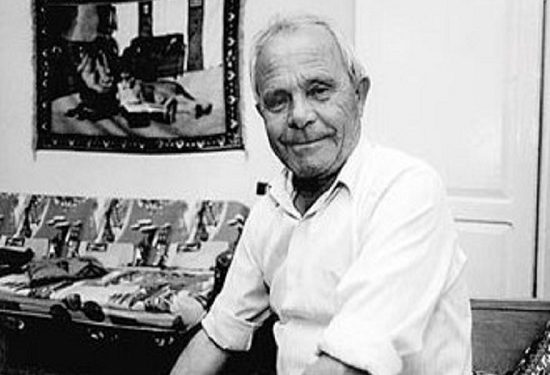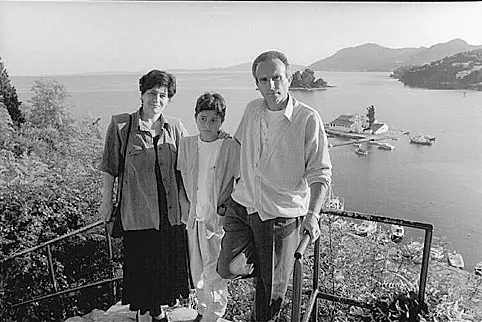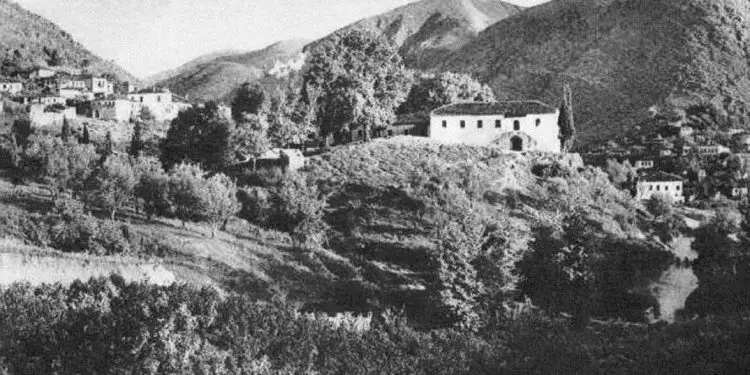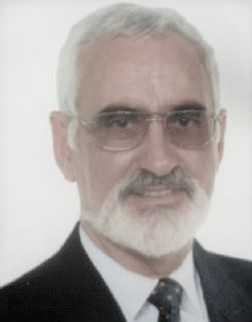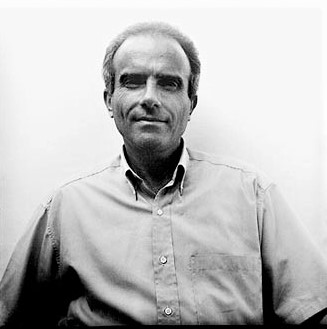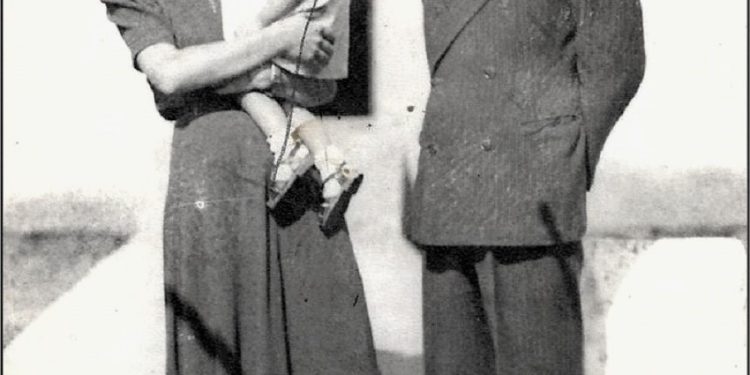From Thanas Gjika
Second part
– Portrait-biography, dedicated to Dino Thanas Martikos-
Memorie.al / During the national history of the Albanian people, many men and women have stood out for the courage with which they opposed the injustices and unjust orders of foreign or local rulers. This phenomenon has been widespread for centuries, but also during the years 1944-1991, when the communist dictatorship ruled. However, the terror policy and propaganda of the party-state forced the people to value servility towards the party and power as bravery. The courageous stances of those who opposed the Party’s policy, or the wrong actions of the Party cadres and the government, were punished with imprisonment, exile, shootings, etc.
Continues from last issue
After a few months, the Greek army withdrew from the Albanian territories, because the German army, the ally of Fascist Italy, entered the war against it. With the return of the Italian army to Saranda, the branch of the Bank of Naples was reopened, where Dinua was re-employed as an accountant. In 1942, young Martiko married Miss Sofia Gribizi, who had graduated from the Female High School of Corfu, the city where she was born and raised. Her father, Vangjel Gribizi, a Greek minority from Gjinokastra Police, after having worked for several years in America, as a emigration, had returned and settled in Corfu, where together with a local Greek, he opened the “Mavros Gatos” café, which became very popular.
Since before the Italian invasion, during his life as a boarder at the Commercial School and later during his years of work in Vlora, as a secretary, Dinua had come into contact with the communist ideas spread by Anastas Lulua and Sadik Premtja. As a young man who had reservations about the Monarchy regime, also occupied by the formula of the idealists of the time: “To build a better world”, Dinua sympathized with the Communist Movement, as a movement that could bring about the creation of a more social system good. In fact, he knew little about communism as an ideology. He had read Karl Marx’s “Communist Manifesto” in Italian and some parts of the work “Capital”.
Thus, when the Anti-Fascist Movement began, he was a sympathizer of the left wing of this movement. Even in 1942, he became a member of the Albanian Communist Party. The Italian Carabinieri wanted to arrest him and arrested him twice, but quickly released him, because in the interrogator, he was determined to oppose the accusations made against him by the informants of the Intelligence Service of the Italian Army, SIM. He did not accept any charges and did not de-conspirator any of his comrades.
The first activities of the communists of Bregdet and Kurvelesi began with efforts to reconcile blood and extinguish hostilities between villages. Dinua presided over almost all the meetings in cooperation with the Kuči communists, personally with Jaho Gjolik, who was a family friend of Martikova. In agreement with Hysni Kapo, Dino was appointed chairman of the Anti-Fascist National-Liberation Front of the Upper Coast, which included the villages: Nivicë-Bubar, Shënvasi, Lukovë, Sasaj, Piqerras and Borsh.
In one of these meetings in Kuç, he expressed his desire to join a partisan squad. Hysni Kapua and Jaho Goliku, who knew Dino’s skills as an orator and the good name he had among the people, insisted that he lead the propaganda in the Upper Bank. Hysniu ended the conversation with the words:
“Dino, if you come to the mountains, you will only add one partisan to us, but if you work in the field, you will add many partisans to us.” And indeed it happened. The number of coastal partisans increased significantly. In terms of influence on the people, the coastal villages, from Palasa to Nivicë-Bubar, were divided at that time between Dino Martikos for the Upper Coast and Zaho Koka for the Lower Coast.
Clash with communist cadres, during the Anti-Fascist War
Enver Hoxha, the leader of the KPSH, forced by Miladin Popovici, rejected the Mukje Agreement and on September 10, 1943, by means of a secret letter signed with the pseudonym “Shpati”, declared the “National Front” “a traitorous organization and collaborators of the occupier”, although this organization had not committed any treason and collaboration with the occupier. Also in this same letter, he ordered the basic organizations of the party to force the formations of the partisan army to no longer carry out any joint action with the forces of the “National Front”, but to fight them without compromise as enemies.
After these decisions, he began to ask the partisan forces to carry out armed actions against the new German invaders, who were replacing the Italian army. These initiatives had several goals: On the one hand, they covered the “National Front” with a bad name as a traitorous organization, on the other hand, it was shown to the great allies that only the partisan army was fighting against the Germans and was forcing them to keep Albania, as many armed forces as possible. These initiatives had another diabolical goal: the striking actions against the German forces would be followed by their revenge, that is, innocent people would be killed and villages and houses would be burned. The people, left without a home, would go to the mountains to join the partisans.
At the end of September 1943, Commander Jaho Gjoliku, a friend of the Martiko family, contacted Dino and without further ado entered the topic: “The Party and the Command appreciate you very much for the partisans you have sent to the mountains until today. But, the Party needs more partisans; therefore it is required of you to gather the territorial forces and with them to carry out an action against the German forces. You can do it somewhere between Nivica and Šënvasija. This action will raise the prestige of the area but also yours. From the reprisal that the Germans will carry out, the people will revolt and fill the mountains with fighters”.
Dinua lowered his head and answered them bluntly: “No! In no way do I agree to implement this order! “It is an order from above and you know that it cannot be contradicted.” Jahua replied, surprised by Dino’s reaction, and added: “And why do you see this order as unenforceable”?! “The action, – Dinua began to clarify, looking his friend in the eye, – will bring the revenge of the Germans. Innocent people will be killed; houses, spoils and crops will be burned. If the villagers get close to the Party and the Movement, they will leave. Tell your fellow commanders that this action will arouse hatred and not love in the people. I cannot undertake the implementation of this order. Shënvasia and Nivica are rich villages. They are not like the villages of Labëria, stones and rocks. The action will have a high economic, but also political, cost.”
Jahua, throwing his arm around her neck, added: “You’re right. You changed my mind too. I will tell my friends on the mountain not to carry out this action”. However, in June 1944, when Dinua was in Corfu, next to his wife and newborn daughter, the party leadership decided, in his absence, to organize an action against the German forces.
The strike was carried out between Shëvasija and Nivica and both villages were burned. It is an event known by the name; “Massacre of Hondrovun”. At the time when the Germans were executing the shooting of 52 innocent men and were riding on cars to deport 90 others, their wives and mothers took to the streets to mourn the tragedy that happened, but not to praise the partisan action. .
Among the victims who were shot, were some relatives of the Martiko family and Dino’s uncle himself. And a month before, the Germans had killed his brother, Aristideh, together with some other villagers, who had captured them in Sasaj. From this group, only Dino’s other brother, Ndrekua, could escape. He realized that the Germans would not forgive him, but would kill him as revenge for the partisan action, so he cleverly made his escape.
On the coast, a massacre like that of Hondrovun was also carried out in Vuno. The village was burned, as a result of the counteraction of the Germans who were attacked during the withdrawal from Greece. But in Dhërmi, the wise old man, together with some villagers, appeared in front of the German forces and greeted them with the words: “You can go peacefully, we have no partisans”. And the Germans passed without causing damage to Dhermi e Palasa. Such actions of the partisan forces, with some rifle shots, resulted in the killing of several German soldiers, but on the other hand, they caused great damage to our people by killing people, burning houses and villages, disappearing livestock, burning crops in the fields. , etc.
These actions served Enver Hoxha more than the war itself. They gave Enver Hoxha political capital, because with them he won the trust of the Yugoslav emissaries and the military representatives of the major allies, that he was their most loyal and most suitable man, who should be entrusted with power after the end of the war. And so it happened…! Today, after 75 years since the end of the Anti-Fascist War, it is necessary to give this war the values it really has and give up its glorification with lies and embellishments. In the texts of the History of Albania, there is no reason to continue to inflate some events of the war, to glorify the leader of the NPSH and the military commanders.
Many of these mistakes and crimes were accepted in November 1944 in the Plenum of Berat, and those speeches are worth returning to today. Until today, there was never an apology to the people, for wrong orders, for declaring the ‘National Front’ a “traitor and collaborator of the occupier”, when it was still allied with the partisan forces, and this act of the leader of the NPSH, pushed many ballistic forces to actually cooperate with the German occupier. Such analyzes and objections, as well as the demand for forgiveness for the mistakes and crimes committed, were not made even during the 47 years when the party ruled the state, and they are not being made even during these 28 years, when the loyal servants of the Hoxha clan, they insult the communist system, but they do not make a critical analysis of the Enverist rule and they do not ask for forgiveness for the mistakes and crimes of that commander.
I am convinced that scientific analyzes will not be made, nor will the people be asked to be forgiven for the crimes of the Anti-Fascist War and the time of the communist dictatorship, even at the Scientific Conference that the Academy of Sciences will organize on the occasion of the 75th anniversary. of the liberation of the homeland. The Hoxha clan and its servants still only want glory and laurels and not scientific analysis or direct criticism.
The honest communist does not follow orders blindly!
The Albanian Communist Party, as a Leninist party, was noted from the beginning for the strong discipline among its members. This feature helped its leadership, that during the armed war, its military formations were superior in the war compared to the formations of the “National Front” and the nationalists. In the ranks of the partisans and agitators of the party, thanks to this discipline, no one dared to discuss the orders given by the leader of the KPSH, who on July 10, 1943, was also elected Supreme Commander of the National Liberation Army.
The orders that Dinua received from above, he always tried to follow diligently, but at the same time he aimed not to violate his own convictions. According to him, the Albanian people were a small people; therefore fratricide should not be practiced among them, but only national unity, against the invader. In order to realize this union and unity of the people, he had spoken to the villagers about the reconciliation of blood and extinguishing enmities. In order to create this national unity, the Peza Conference was organized on September 16, 1942, and the Mukje Meeting was organized on August 2-3, 1943. In this course of events, national unity was crystallized in Dino’s consciousness as a basic principle for the progress of the Anti-Fascist War.
Until the end of August 1943, he had meticulously implemented the orders that came from above, because they did not conflict with the principle of the national unity of the Albanian people. However, after mid-September 1943, the partisan forces of Breg captured a young ballistic missile. The commander of the partisan forces, thinking that he would please Dino, addressed him: “Dino, take the soul of this clown, who raised his hand against the party”! The partisans were waiting impatiently for the boy to fall to the ground dead. Dinua approached him without speaking. His heavy, serious appearance scared the ballistician, who said to him, pleading: “I have not killed any partisan. I have never fought against Albanians. Falmani life, we are brothers”.
Dinua did not take out his revolver. Another could have killed him immediately, to gain points, but he said calmly, in a somewhat commanding tone: “I won’t kill you on condition that you don’t raise your hand against the partisans again. Go”! The excited boy bent down to kiss his hand, but Dinua didn’t allow it. The commander was surprised, but did not challenge Dino. Later he told him that; he regretted not doing that “honor” to another.
Dino Martikua took over Saranda without bloodshed!
On September 10, 1943, when the capitulation of Fascist Italy became known, Jaho Gjoliku came to Shënvasi with a partisan battalion, together with Commissioner Abdul Hakiu. During lunch, they organized the plan to take over the armaments of the Italian forces in Saranda. The project-plan thought from above was for Dino Martiko, as a good connoisseur of Italian and a brave agitator, to enter into talks with the commander of the garrison, Colonel Elio Betini. Along with Dino, Abdul Hakiu was also scheduled to be present at the meeting. To guarantee the success of the surrender, the city would be surrounded by the partisan battalion, as well as by the territorial forces of the villages of Nivicë, Shënvasi, Lukovë, Sasaj, Piqeras and Borsh.
If the talks went badly, the participants in the siege would have to face the Italian army stationed in Saranda, which was a regiment with full organics. For organizational reasons, the Coast Guard could not come to the rescue that day. Partisan forces spent the evening in the Monastery of Saint George in Nivicë Bubar. The letter was conceived and written in Italian by Dino and addressed to Colonel Betini, on behalf of the command of the Partisan battalion, to hand over all the armaments as well as the materials of the military warehouses at all costs. Otherwise, force of arms would be used against them.
The next day, in the early hours of the morning, the command of the Italian garrison of Saranda informed the battalion that it agreed to enter into an agreement for talks. Meanwhile, the partisan forces dispersed to carefully surround the city. At 9:00 a.m. on September 11, 1943, talks began with the Italian regimental headquarters. According to the decision taken earlier in the battalion, Dino Martikua asked the garrison commander to hand over all the weapons and military equipment, otherwise the Italian soldiers would not be allowed to board the ships to return to Italy. At first, the talks were not giving the right result. The headquarters of the Italian regiment strongly opposed the demands. Dinua successfully faced the threats and opposition of the Italian military. He insisted on the demands of the Albanian side and emphasized that the Italian army would suffer unnecessary damage from the armed conflict.
Dinua waited, sitting heavily. He showed no signs of hurrying to get a quick answer. He waited without exchanging a word with his colleague. Then Colonel Belini, after consulting with his colleagues, accepted the unconditional surrender, so as not to harm his army further. His regret for making this decision was deep, as evidenced by the tears in his eyes. This is how the peaceful surrender of the port city of Saranda was achieved and the Italian army agreed to leave, leaving behind all the military weapons, which were quite modern compared to the weapons of the partisans.
Within a few hours, the partisan battalion entered the city and without wasting time, began taking over military material and warehouses. In the evening of that day, when the Italian army began to board the ships, in front of the “Piro Pallas” hotel, the people of Saranda organized a big festive rally. They manifested freedom, which after a year, began to be displaced by a spiritual anxiety, which would continue to rule in the minds of many former participants in the war and the Albanian people, for almost half a century…!
It is worth mentioning here that while Dino Martikua defeated the Italian command of Saranda and achieved victory without causing any damage, Bedri Spahiu, the commander of the partisan forces, who was tasked with leading the negotiations for the surrender of the Italian forces of Gjinokastra, failed. However, the success of Dino Martikos was never written properly, and it was kept silent. As we will see below, this brave and honest communist fought because he refused, both during the War and after it, to obey and blindly follow the orders that came to him from above.
Clash with cadres of the Security Party, after the Anti-Fascist War
After the end of the Anti-Fascist War, the partisan forces that took power began to behave as if they were; “Ali himself, the Qadi himself”. Slowly, fear became second nature for people thanks to shootings and arrests without trial for people who were declared without facts as “enemies of the people”. Wartime propaganda for abundance, well-being, freedom and democracy, very soon after the war began to be replaced by greed, the cultivation of fear, lies, servility, etc. In December 1944, Dino was appointed secretary of the Executive Committee of the Saranda District. In addition to the first secretary of the district and the chairman of the Committee, the head of Saranda’s Security was also a member of the basic organization of the party where he was a member. One evening, just as the meeting began, the latter began to inform the members of the cell:
“Today at lunch we arrested the two sons of the merchant, Mihal Llambro, because they wanted to escape to Greece. I ask the organization to approve their arrest. Let them also come to join their father, to the prison of Gjinokastra Castle, where he will welcome them with open arms”. The first secretary of the Party, the chairman of the Executive Committee and other members of the organization did not object when someone was required to be arrested. Conformism did not allow them to defend those who were declared “enemies of the people”.
Dinua calmly asked: “How old are Mihal Llambro’s sons?”
“One is twenty, the other eighteen, if I’m not mistaken,” answered the Serbian boss. “How many florins did they have with them”? Dinua followed.
“We did not find florins in their pockets, not even in the small bag they had with them.” “Where did you catch them”? Dinua asked again. “In Limjon”, replied the boss. Then Dinua, turning to the other members of the cell, continued in a stronger voice: “Until today, I have not heard of people being accused of escaping to Limjon, which is a suburb of Saranda, only two kilometers away and it is not a border. Then these rich boys, if they had set out to escape, would have taken a few florins with them.”
And turning to the head of Security, he continued: “How did you know that they would escape? With such fabricated and malicious accusations, we, as communists, will never bring the justice that we preached to the people during the War”. “I follow the Party’s line”, replied the chief with aplomb. “I want to put these two stinkers in jail. In the investigator, we have methods that tighten them and they accept what we ask of them”.
There was silence. The other members of the cell did not object to Dino’s words and the meeting was closed without approving the Security chief’s request. The two boys were released, but the head of the Security, kept an eye on this failure. Dino’s controversial discussions and interventions caused concern and annoyance not only to the head of Security, but also to the first secretary of the district Party, together with the chairman of the Executive Committee. They were afraid of the Chief of Security…!
“I refuse to make arrests in Shënvasi and Nivica”!
Dino’s biggest blow to the Party’s grassroots organization, of which he was a member, came when the order came from above to begin the planned arrests. The state party, in order to instill fear and terror in the people, mobilized the State Security, so that this sector, like the economic and agricultural sectors, would work with a plan to make the arrests. These were organized on the basis of a predetermined plan in the offices of the Departments of Internal Affairs, in cooperation with the district party committees.
This terror continued until the end of 1989, when the APS leadership was frightened by the assassination of Nicholas Ceausescu. No one dared to oppose the arrests, even when their friends, colleagues or family members were arrested. In social settings, everyone shut up. Of course, there were many Albanians who thought that this policy was unfair and expressed their dissatisfaction by whispering in family circles or in very close company, while Dino’s attitude was very courageous and whispers were not enough.
The above head of Security had prepared the lists to start the arrests on the Coast as well. When he heard this conversation being opened in the meeting of the cell, Dinua felt as if someone hit him in the head with a hammer. It seemed quite difficult to make mass arrests in Šënvasi and Nivica. Revolted, he turned to the head of the Security: “We all know that during the War, among the villagers of Nivica and Shënvasija, there was no collaborator with the enemy. Likewise, even after the War, they have not shown hostility to the Party. The most important thing, for the future of our people, is that; the party should not create enemies where there are none. “Unfortunately, we are left with some religious and regional divisions and enmity from the time of Turkey.”
And raising his voice, he continued: “In your Borsh it is true that there were spies who collaborated with the Italians and Germans.” “I have put all the borshiots, ex-ballistas, in prison, without making any distinction”, replied the head of the Branch boastfully. Dinua saw with disgust the man who boasted that he had arrested and imprisoned his own villagers and said to him: “In Nivicë and Shënvasi, there was no spy and no ballistic missile, so as long as I am a member of the party, I will not allow anyone to be arrested from my fellow villagers”. Memorie.al
The next issue follows




